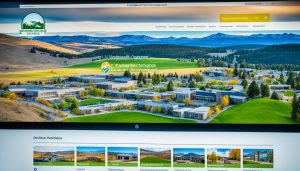Are you considering pursuing a doctoral degree? Look no further! In this article, we will explore the numerous benefits and opportunities that come with obtaining a doctoral degree. Whether you’re interested in colleges that offer doctoral degrees, universities offering doctoral degrees, colleges with doctoral programs, or schools offering doctoral programs, we’ve got you covered.
Obtaining a doctoral degree can enhance your expertise, expand your network, explore various career options, enhance your impact, and allow you to evaluate your readiness. With a multitude of specialized doctoral degrees, such as Ph.D. programs that focus on research, there is something for everyone.
So, let’s dive in and discover how pursuing a doctoral degree can advance your academia and career in various fields.
Key Takeaways:
- Pursuing a doctoral degree offers numerous benefits for career advancement.
- Doctoral degrees help enhance expertise and develop transferable skills.
- Expanding your network through a doctoral program can increase visibility and influence.
- A doctoral degree opens up a plethora of career options in academia and beyond.
- By pursuing a doctoral degree, you can make a positive impact and contribute to knowledge development in your field and society.
Enhance Your Expertise
Achieving a doctoral degree offers numerous benefits and opportunities for career advancement. One of the key advantages is the ability to deepen your knowledge and skills in a specific area of interest. Through rigorous academic study and research, a doctoral program provides a platform for individuals to explore their chosen field in-depth and contribute to the advancement of their discipline.
By conducting original research, doctoral students delve into uncharted territory, pushing the boundaries of knowledge and making groundbreaking discoveries. This process not only expands their expertise but also fosters critical thinking and analytical skills, allowing them to approach complex topics with a fresh perspective.
Obtaining a doctoral degree also helps develop transferable skills that are highly valued in various professional settings. Critical thinking, problem-solving, communication, and project management are just a few examples of the versatile skills individuals acquire throughout their doctoral journey. These skills not only make them more competitive in their chosen field but also equip them to tackle challenges in diverse contexts.
Deepening knowledge and skills through a doctoral degree not only enhances your expertise but also unlocks endless possibilities for personal and professional growth.
As individuals engage in comprehensive literature reviews, collaborate with fellow scholars, and engage in intellectual discourse, their ability to communicate complex ideas effectively improves. Furthermore, the rigorous research and academic writing involved in doctoral studies foster meticulous attention to detail and the ability to synthesize and present information in a clear and concise manner.
Transferable Skills Gained Through a Doctoral Degree
| Skill | Description |
|---|---|
| Critical Thinking | Analyzing complex problems, evaluating evidence, and making informed decisions. |
| Problem-Solving | Identifying challenges, developing creative solutions, and implementing effective strategies. |
| Communication | Conveying ideas and research findings clearly, both in writing and oral presentations. |
| Project Management | Planning, organizing, and executing complex research projects within defined timelines. |
By acquiring and refining these transferable skills, individuals with doctoral degrees can adapt to various professional environments and pursue a wide range of career paths. Whether in academia, research institutions, industry, or entrepreneurship, the deep knowledge and multidisciplinary skills gained throughout the doctoral journey provide a strong foundation for success.
The pursuit of a doctoral degree not only deepens knowledge and expertise but also cultivates a passion for lifelong learning. It pushes individuals to continually expand their intellectual horizons, fostering a curiosity and drive to stay at the forefront of their field.
Pursuing a doctoral degree is a transformative experience that enhances your expertise, broadens your career prospects, and equips you with a rich skill set that extends beyond the confines of academia.
Expand Your Network
When pursuing a doctoral degree, you have the opportunity to build a professional network that can greatly enhance your career prospects and personal growth. Interacting with experts, scholars, and mentors in your field opens doors for collaboration, knowledge exchange, and professional development. Let’s explore how pursuing a doctoral degree can help you build your professional network, collaborate with experts, present your work at conferences, and enhance your visibility and influence.
Collaborate with Experts
As a doctoral student, you will have the chance to collaborate with renowned experts in your field. This collaboration can take the form of joint research projects, co-authoring publications, or participating in interdisciplinary initiatives. By working closely with these experts, you not only gain invaluable insights and guidance but also establish meaningful connections that can further your career.
Present Your Work at Conferences
Conferences offer a platform for sharing your research and ideas with a wider audience. As a doctoral student, you can present your work at conferences, workshops, and seminars, allowing you to receive feedback, gain recognition, and generate interest in your research. These presentations provide an excellent opportunity to network with other researchers, industry professionals, and potential collaborators.
Enhance Visibility and Influence
By actively participating in academic conferences, workshops, and seminars, you can enhance your visibility and influence within your field. Presenting your research and engaging in discussions allows you to establish yourself as an authority in your area of expertise. This increased visibility can lead to invitations to contribute to publications, serve on conference panels, or collaborate on future projects, further expanding your professional network.

Building lasting connections and expanding your network is crucial for professional growth. Collaborating with experts, presenting your work at conferences, and actively engaging in academic and industry events not only enhances your visibility but also opens up new opportunities for collaboration and career advancement.
| Benefits of Network Expansion | How to Achieve |
|---|---|
| Access to diverse perspectives and knowledge | Attend conferences and seminars, participate in collaborative projects |
| Potential for collaborative research and publications | Engage with experts and mentors, establish research partnerships |
| Increased visibility and recognition in the field | Present research at conferences, contribute to publications |
| Opportunities for professional development and mentorship | Seek guidance from experienced professionals, join professional associations |
Expanding your network is a continuous process that requires active engagement and participation. By seizing the opportunities provided by pursuing a doctoral degree, you can build a strong professional network that will support your growth and success throughout your career.
Explore Your Options
Having a doctoral degree can open up a diverse range of career opportunities beyond academia. While many PhD graduates pursue roles in teaching, research, administration, or leadership within universities and colleges, their expertise and skills are highly sought-after in other sectors as well.
Government organizations often value the analytical and research skills that doctoral degree holders possess. These individuals can contribute to policy-making, program evaluation, and social impact initiatives. Whether it’s working in local, state, or federal government agencies, there are numerous opportunities to make a difference and contribute to public service.
Non-profit organizations also benefit from the specialized knowledge and expertise of individuals with doctoral degrees. These organizations are often dedicated to addressing societal challenges and can greatly benefit from the research, innovation, and strategic thinking skills of PhD graduates. Whether it’s working in international development, healthcare, environmental conservation, or social justice, doctoral degree holders can apply their knowledge to advance meaningful causes.
The consulting industry is another realm where doctoral degree holders can thrive. With their advanced problem-solving abilities, critical thinking, and deep subject matter expertise, PhD graduates can offer valuable insights and solutions to clients across various sectors. Whether it’s management consulting, research consulting, or subject matter expertise consulting, there is a strong demand for their specialized skills.
Furthermore, having a doctoral degree gives individuals the opportunity to start their own businesses or ventures. Entrepreneurship allows PhD graduates to apply their expertise in innovative ways, whether it’s launching a tech startup, consulting firm, or social enterprise. By leveraging their skills, knowledge, and research, they can create their own path and make a unique impact in their chosen field.

Charting Your Path Beyond Academia
When considering a career beyond academia, it’s important to assess your transferable skills, interests, and values. Identify areas where your expertise can be applied outside of traditional academic roles and explore opportunities that align with your passions.
By broadening your perspective and exploring a variety of roles in government, non-profit organizations, consulting, or starting your own business, you can embark on a fulfilling and impactful career journey. Your doctoral degree is not just a qualification for academia but a stepping stone to a world of possibilities.
Enhance Your Impact
Pursuing a doctoral degree empowers individuals to make a positive impact on their field, society, and the world. By addressing important questions, challenges, and issues within their area of study, doctoral candidates can generate new insights, propose innovative solutions, and contribute to the advancement of knowledge. Through their research, they have the opportunity to make a lasting and meaningful difference.
Sharing knowledge and skills is another way doctoral candidates can enhance their impact. By disseminating their findings, teaching students, collaborating with colleagues, or engaging with the public, they contribute to the development of knowledge, policy, practice, and culture. This not only benefits their immediate academic community but also creates ripple effects that extend far beyond the confines of their field.
“The true measure of the value of any business leader and manager is performance.” – Brian Tracy
Doctoral candidates have the unique platform to influence and shape their respective disciplines. By actively participating in academic conferences, seminars, and workshops, they can engage in discussions, present their research findings, and learn from experts in their field. These opportunities allow them to broaden their perspectives and refine their ideas, making their impact even more significant.
Impact Domains of Doctoral Research
| Domain | Description |
|---|---|
| Social Justice | Addressing inequality, discrimination, and social issues to promote fairness and inclusivity. |
| Environmental Sustainability | Tackling environmental challenges, climate change, and promoting sustainable practices. |
| Medical Breakthroughs | Advancing medical knowledge, treatments, and developing new therapies. |
| Technological Innovation | Exploring cutting-edge technologies, improving efficiency, and driving progress. |
The impact of doctoral research goes beyond academia. It influences policy-making, contributes to evidence-based decision-making, and aids in societal progress. It is through the collective efforts of doctoral candidates that profound and transformative changes are made possible.

Evaluate Your Readiness
Embarking on a doctoral degree program requires **commitment**, **dedication**, and **passion** for your chosen topic. It’s a journey that involves numerous challenges and rewards. As you contemplate this path, it’s crucial to **evaluate your readiness** and ensure you’re equipped for the road ahead.
Before making a decision, take the time to **research requirements** and expectations for different doctoral programs. Each program may have specific prerequisites, such as academic achievements, research experience, or professional background. Understanding these criteria will help you assess if you possess the necessary qualifications.
Moreover, consider the demands of a doctoral degree, such as finding **funding**, ensuring a work-life balance, managing **stress** and **isolation**, and persevering through setbacks and criticism. Reflect on your ability to navigate these challenges and maintain your **dedication** to see the journey through.
Remember, a doctoral degree is not a decision to be taken lightly. It requires a deep **commitment** and sustained passion for your field of study. Without these qualities, the road may become arduous.
As you contemplate whether a doctoral degree is right for you, seek **advice and guidance** from mentors, advisors, and peers who have already embarked on this academic endeavor. **Their insights**, experiences, and perspectives can be invaluable in helping you make an informed decision.
Quotes:
“Evaluating your readiness for a doctoral degree means understanding the level of **commitment** and **dedication** required. Take the time to explore your motivations and passions.” – Dr. Jane Stevens, Professor of Psychology
“Before pursuing a doctoral degree, it’s crucial to **assess your research requirements** and determine if a doctoral program aligns with your academic and career goals.” – Dr. Michael Johnson, Dean of Graduate Studies
Take the opportunity to evaluate your readiness, considering your **passion** for your area of study, your ability to meet the **research requirements**, and your willingness to seek **advice and guidance**. By doing so, you’ll be better equipped to pursue a doctoral degree and embark on an enriching academic journey.

Colleges and Universities Reimagined: The New Carnegie Classifications
The higher education landscape is constantly evolving, and so are the frameworks used to categorize colleges and universities. The Carnegie Classifications, a widely recognized system for classifying institutions, have recently undergone significant changes to better reflect the diversity and complexity of higher education institutions.
The new Carnegie Classifications now utilize a three-dimensional definition of institutions, taking into account various factors such as size, mission, location, and more. This holistic approach provides a more comprehensive understanding of each institution’s unique characteristics and offerings.
One of the key changes in the classification system is the criteria for earning the highest research designation. The criteria have been simplified, with a focus on research spending and the number of research doctorates awarded. This shift aims to emphasize the importance of research and innovation in academic institutions.
Additionally, the new Carnegie Classifications introduce a new category to recognize institutions that invest in research. This acknowledgment highlights the significance of research and its impact on shaping the future of academia and society as a whole.
These changes to the Carnegie Classifications are designed to make comparisons and decision-making more accurate and meaningful. Institutions can now be better understood in the context of their unique contributions to research, education, and their respective fields.

Impact on Higher Education
The updated Carnegie Classifications have far-reaching implications for higher education. Institutions can now use these revamped classifications to showcase their strengths and areas of expertise in a more nuanced way. Prospective students and researchers can also benefit from these changes, as they can make more informed decisions based on an institution’s research focus and recognition.
The new Carnegie Classifications provide a clearer and more accurate picture of the research landscape in higher education. It recognizes the importance of research in driving innovation and advancing knowledge across disciplines.
Furthermore, the updated classifications demonstrate the constant evolution and adaptation of the higher education sector. By reimagining the way institutions are categorized, the Carnegie Classifications exemplify the innovative spirit that drives change and progress in academia.
| Old Classification | New Classification |
|---|---|
| Based primarily on degree-granting programs. | Utilizes a three-dimensional definition of institutions, considering size, mission, location, and more. |
| Complex criteria for research designation. | Simplified criteria focused on research spending and research doctorates awarded. |
| Did not specifically recognize institutions investing in research. | Introduces a new category to acknowledge institutions investing in research. |
The new Carnegie Classifications ensure that the higher education landscape is accurately represented and that institutions receive recognition for their commitment to research and innovation. These classifications contribute to a more vibrant and dynamic academic environment that values and promotes excellence in research and scholarship.
Conclusion
Pursuing a doctoral degree presents countless opportunities for career advancement and personal growth. It offers a range of benefits, including enhanced expertise, expanded networks, and the ability to explore various career paths. Individuals with doctoral degrees have the capacity to make a significant impact on their field and society as a whole.
However, before embarking on this journey, it is crucial to evaluate one’s readiness and motivation. Doctoral programs require dedication, commitment, and a passion for research. It is essential to research different programs, understand their requirements and expectations, and seek advice from mentors and peers who have gone through the doctoral journey.
Moreover, the evolving Carnegie Classifications provide a more comprehensive and accurate understanding of higher education institutions. These classifications reflect the changing landscape of higher education and offer valuable insights for individuals considering pursuing a doctoral degree. Staying informed about these changes and considering their implications can help individuals make informed decisions and navigate the dynamic realm of higher education.
In conclusion, doctoral degrees offer exceptional opportunities for career advancement, personal growth, and impact. By evaluating readiness, understanding the benefits, and staying informed about the evolving higher education classifications, individuals can make informed decisions about pursuing a doctoral degree and charting their path to success in their chosen field.




No comments! Be the first commenter?